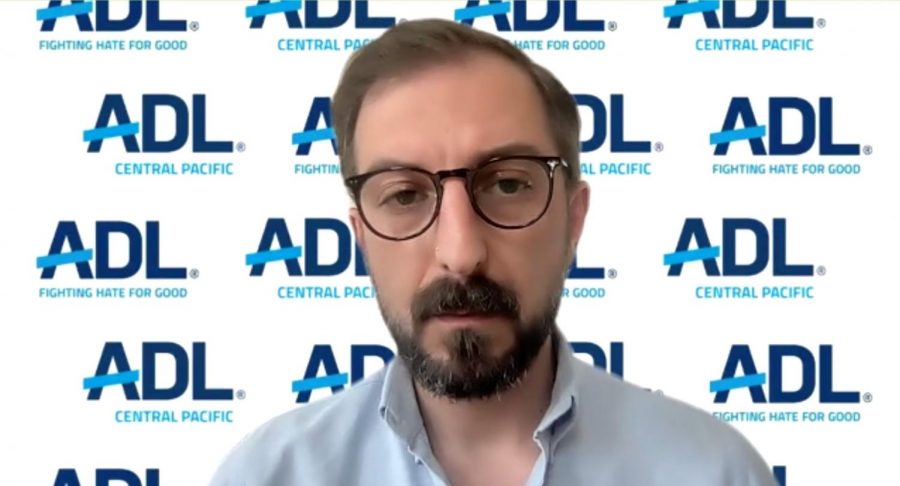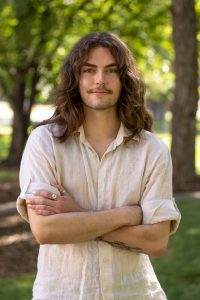Vlad Khaykin ‘Breaks the Silence’ During 2021 U Remembers Keynote Address
Vlad Khaykin, National Director of Programs on Antisemitism for the Anti-Defamation League, delivers the keynote address on April 9, 2021 for the virtual “U Remembers 2021” event hosted by the U’s office of Equity, Diversity and Inclusion. (Photo by Jack Gambassi | Daily Utah Chronicle)
April 15, 2021
From April 5 to 9, the University of Utah hosted its annual U Remembers event, centered around this year’s theme: “Breaking the Silence.”
U Remembers is put on by volunteers from the alumni association, the U Remembers planning committee and Equity, Diversity, and Inclusion at the U. It focuses on the historical effects of racial discrimination.
This year, the theme focused specifically on combating the rise in antisemitism by speaking up and breaking the silence.
The week kicked off with a conversation on the “Crime of Complicity” where speakers discussed the legal implications of bystanders not intervening when witnessing a crime.
Another event was for Holocaust Remembrance Day, or Yom Hashoah, which is observed from the evening of April 7 to the evening of April 8. A Yom Hashoah Virtual Commemoration was hosted by the United Jewish Federation of Utah, featuring an interview with Helga Silberberg, a survivor of the Holocaust.
The final event was the keynote address from Vlad Khaykin, the national director of programs on antisemitism with the Anti-Defamation League.
Khaykin said he was honored to be asked by the U to speak, as he has spoken at the U before and run various workshops. This event is of particular importance to him, though, as he is the grandson of Holocaust survivors and a refugee of state-sponsored antisemitism in the Soviet Union.
“Breaking the silence means becoming an active participant shaping history, rather than a bystander passively observing history unfolding around us,” Khaykin said in a written statement to the Chronicle.
Khaykin said antisemitism is the ideological core of white supremacy.
“White supremacists see a Jewish hand behind everything they perceive as wrong or sick with society, whether that’s economic problems, feminism, race-mixing, or the COVID pandemic,” he said.
According to Khaykin, there is no “silver bullet” for eliminating hate in the world, but certain measures can be taken to mitigate the spread of harmful ideologies.
“We need educational institutions to do their part, certainly, but we also need tech companies to step up and put measures in place to ensure the innovations they create are not used to spread hatred and incite violence,” he said.
In addition to education and technology, Khaykin said major changes are needed on governmental, legal, social and individual levels.
“We as individuals need to take personal responsibility for our own sphere of influence, whether in the classroom, in the workplace, in the community, or in the halls of power,” he said.
In his keynote address, Khaykin hoped to illuminate how the effects of the Holocaust are still impacting contemporary society.
“I also hope to impress upon the community the imperative of solidarity across difference in confronting these challenges,” he said.
At a predominantly white institution such as the U, Khaykin said this is an opportunity for those in the majority to recognize their privilege and use it to combat hate.
“This is particularly important for institutions, which have tremendous impact on the lives of their constituents and our society as a whole,” he said.
The keynote address began with a moment of silence for the victims of the Holocaust and other genocides, past and present.
Then, Khaykin began his address with some historical context, where he talked about his hometown of Gomel, Belarus where over one-third of the population was Jewish. On Aug. 19, 1941, the Nazis invaded the city and corralled the Jewish people into ghettos.
“In the following months, the Nazis proceeded to murder the remaining Jews of the city,” Khaykin said. “Centuries of Jewish life in Gomel were extinguished.”
By the end of World War II, he said, nine out of every ten Jewish people in Belarus had been murdered.
“The odds of my being here with you today to deliver this address are infinitesimal, and it is a reminder of the unlikely blessing of being alive,” he said. “For today, more than 75 years since the end of the Holocaust, the Jewish community has still not recovered its population to pre-Holocaust numbers.”
Khaykin emphasized how antisemitism and white supremacy are not just happening halfway across the world — they are right here on campus.
“Even right here at the University of Utah where, in the last several years, white supremacists have intensified the propaganda and recruitment activities on campus,” he said. “Banner drops with messages targeting immigrants on the George Eccles footbridge, fliers spreading bigotry and xenophobia under the guise of patriotism at the Marriott Library, and so on.”
Khaykin referenced late Holocaust survivor Elie Wiesel and said silence only helps the oppressors.
“By speaking up and taking a stand, we become a subject in this human’s story rather than merely an object, playing an active role in determining the trajectory of human history toward justice,” he said.
Emma Houston, a special assistant for Equity, Diversity, and Inclusion at the U, echoed Khaykin by saying silence is not the answer.
“We do hope that the events of this week have inspired you to become an active participant,” Houston said. “As Mr. Khaykin said, we cannot be silent. We cannot be silent, helping to eliminate hate in all its forms.”
Khaykin closed out his speech by asking people to commit to breaking the silence.
“So commit today to never remaining silent in the face of bigotry and injustice,” he said. “Commit yourselves to ensuring that ‘never again’ isn’t merely a trite truism, but a guiding maxim that compels us to act.”









